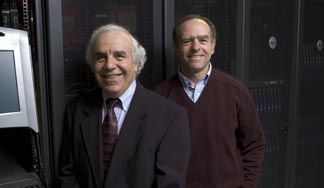As Cornell Theory Center winds up Microsoft pact, it seeks faculty advice on future, direction

Under new leadership, the Cornell Theory Center (CTC) is moving in new directions and asking for advice.
CTC will hold a town hall meeting Tuesday, Nov. 22, at noon in G10 Biotechnology Building, inviting members of the Cornell research community to discuss new opportunities and directions for CTC-supported computational science and engineering. "Computational science" refers to the use of computing as a tool in scientific research.
From its inception in 1984, CTC has existed to support research by providing high-end computing resources, extensive computational expertise and training in computational tools and methods. This remains the core mission of the center, said CTC Acting Director Tony Ingraffea. But informal conversations with faculty from colleges across the campus indicate the need for a more diversified, heterogeneous environment including support for a variety of operating systems, and an expansion of CTC support for research group-owned clusters, he said. The town hall meeting is intended to allow all members of the Cornell community to discuss their computational research needs and ideas for CTC's directions.
"This is an opportune time for these discussions," Ingraffea said. "The center is concluding a very successful large-scale partnership with Microsoft, during which we successfully proposed that the company create a high-performance computing (HPC) division. This partnership allowed CTC to provide three very powerful HPC clusters to Cornell researchers at no cost to Cornell." Although Microsoft is now devoting significant funds to its own in-house development of Windows HPC, Microsoft President Bill Gates announced at the Supercomputing 2005 Conference Nov. 15 that Cornell would be the site of one of 10 new Institutes for High-Performance Computing the company will fund. The institutes, Gates said, will help to guide ongoing software research and product innovation at Microsoft.
CTC was born in 1985 as one of five academic supercomputing centers funded by the National Science Foundation (NSF) to make high-performance computing, previously the province of government and industry, available for academic research. While the other four centers were built around "linear" supercomputers like the Cray, Cornell opted from the beginning to experiment with parallel computing, starting with multiprocessor machines from IBM. Parallel computing allows very large computational tasks to be performed quickly by breaking them into many pieces that are processed simultaneously on an array of processors.
In the winter of 1997 NSF funding ended, but CTC continued to serve Cornell researchers, by then with a 160-processor IBM computer. Soon, working with Microsoft, Dell, Intel and other industrial partners, CTC pioneered the development of high-performance "cluster" computers made by linking off-the-shelf computers in parallel. Cornell research improved and advanced the use of clusters using the Windows operating system, which are now in use all over the world for business and academic computing.
With the installation of its newest cluster, Velocity 3 (see related story), CTC has begun to decommission its early Windows clusters (Velocity 1 and Velocity Plus) to make room for new clusters running other operating systems.
The new cluster was purchased with CTC funds, according to the center's executive director, Linda Callahan, who added that another such upgrade in the near future would be difficult to pull off.
Vplus is currently being used as an experimental Linux cluster, in preparation for the conversion of Velocity 2 to Linux in early 2006. The goal is to make an HPC facility available to researchers who already have demanding applications written for Linux. CTC is also experimenting with clusters of Solaris servers, and the Agricultural Research Service (ARS) of the U.S. Department of Agriculture is funding the creation of a "small" (36 processors) cluster of Apple G5 Xserve servers, to be hosted by CTC and used by the USDA-ARS -Center for Agricultural Bioinformatics at Cornell for research on gene regulation in bacterial plant pathogens.
"CTC's future priorities will be established in concert with faculty input," said Robert Constable, dean of Computing and Information Science (CIS), of which CTC is a unit. "The center has the flexibility to reinvent itself to meet researchers' requirements; we need to be sure we are moving in the right direction."
One significant change in CTC's direction, Constable said, is in recognition of the growing number of applications that are data-intensive. CTC has been building expertise in databases and is working closely with the computer science data-mining group, he said.
The addition of John Guckenheimer to CTC's leadership team as associate dean of the Faculty of Computing and Information Science reflects a new emphasis on computational education, Constable added, aimed at creating the next generation of computational scientists and engineers with new, multifaceted skills.
"Our vision is to provide the highest-end heterogeneous computing environment, to increase the usability of HPC by developing more computational tools, to seamlessly integrate access to powerful databases and to further integrate computational science and engineering into the curriculum," said Ingraffea. "We maintain a strong commitment to the Cornell research community and collaborators from academia, government and industry. The town hall meeting will help us to understand how best to implement that vision."
Media Contact
Get Cornell news delivered right to your inbox.
Subscribe